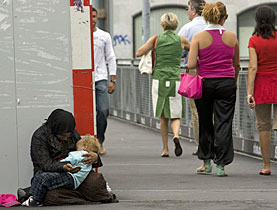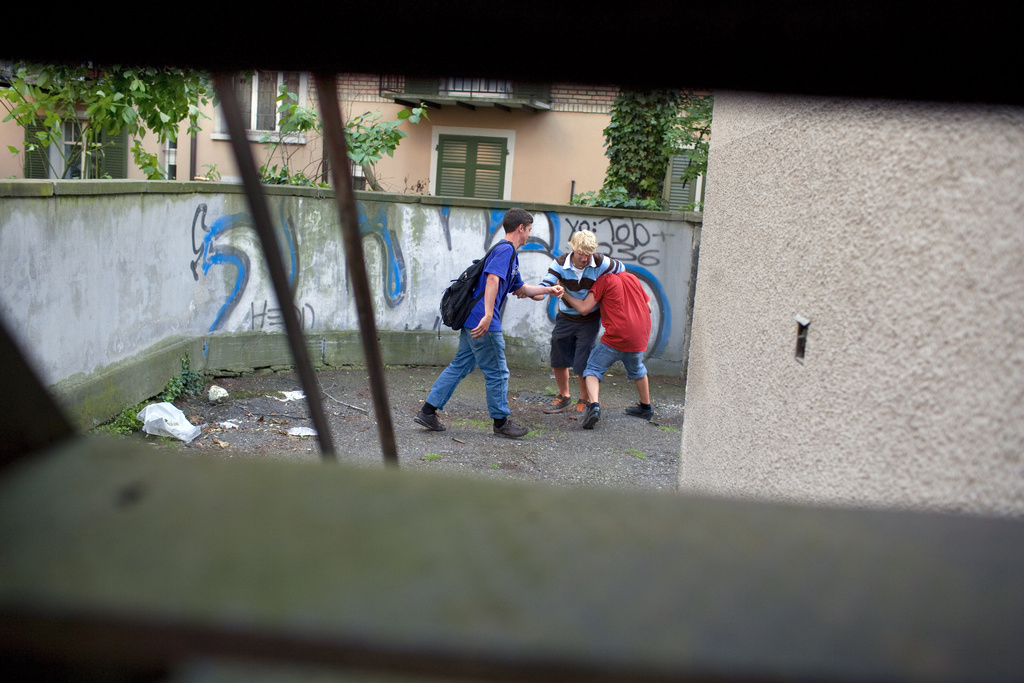Call made for tougher sentencing of youth crime

A series of vicious attacks in Munich by three Swiss students on a school trip has led to calls for a revision of the youth criminal justice system, which stands accused of being too soft.
But criminal law professor and centre-left Social Democrat Parliamentarian Daniel Jositsch tells swissinfo.ch that current legislation should be enough to deal with the problem of youth violence.
He says that imposing tougher sentences would be preferable to drawing up new legislation. Judges, he adds, have the leeway to act but have refused so far to apply legislation to its fullest extent.
As a result, they stand accused by critics of applying “soft justice” and “mollycoddling”.
swissinfo.ch: The three students in Munich continued to beat up their victims even when they were lying on the ground. Why were they so brutal?
Daniel Jositsch: There can be different reasons. The government report on repeat youth offenders issued this week highlights a number of causes: scholastic deficiencies, personal and family structures, lower socio-economic status, a negative environment, drugs or the use of violent videos and games.
swissinfo.ch: The youths were under the influence of alcohol and cannabis. Is this typical for cases of youth violence?
D.J.: Definitely, especially when alcohol is involved. People, even adults, lose their inhibitions and express their aggressiveness under the influence of alcohol. But alcohol is not the root cause of excessive violence. It just speeds up a process by eliminating inhibitions.
swissinfo.ch: The teenagers had already been through the justice system without their school knowing anything about it. Now politicians are saying that information should have been available, even though teenagers might be stigmatised.
D.J.: The need to inform is extremely important. Stigmatisation is not an issue here since it would only be stating who is responsible for a crime. When a youngster is sentenced, he or she must live with that just as the school must. The information must only be passed on though when grievous bodily harm or sexual offences are concerned, not minor offences.
But that means schools should also have the power to react. The school authorities should be able to decide if a student is allowed to join a class trip, should be moved to another class, etc.
swissinfo.ch: That means that a teacher’s job could become even harder.
D.J.: Of course. A youth who has been sentenced for excessive violence is a burden for a teacher. If this person has no information about a conviction, he or she won’t find the job any easier.
Given the difficulties that teachers face today, classes should not be made bigger, but smaller. If a teacher has 28 students, he or she cannot encourage the smarter ones if there are other difficult problems to deal with within the class. It is cynical to expect schools to take on more responsibility, as some right-leaning politicians are demanding, and at the same time save money by making classes bigger.
swissinfo.ch: The youth justice system is being criticised for being too “soft”. Are judges being too lenient with violent youngsters?
D.J.: Yes, there seems to be a general tendency to do so. I brought a motion in parliament to find out why judges are not using the full extent of the law for sentencing youngsters – something that is also happening with adult offenders. Surprisingly there were 177 votes in favour and just two against. So there is a general mistrust of the justice system.
You can interpret the mild sentencing as a refusal of the judges to implement the wishes of the lawmakers. If a judge doesn’t want to impose stricter sentencing, there is no point to the legislation, and this cannot be the case.
swissinfo.ch: So we don’t need tougher laws and harder sentencing?
D.J.: No. There is no point in revising laws if judges don’t make full use of them. Only for specific offences should the sentencing be hardened. This is what parliament is doing now for cases of rape.
swissinfo.ch: Can society protect itself from excessive acts of violence by youngsters?
D.J.: We need to improve communication between schools, parents, the private environment, associations, youth justice and guardianship authorities. To do that we need to loosen some of the data-protection legislation. We also need laws that allow the authorities to intervene earlier and exert influence on parents when necessary.
As the former head of the school commission in my commune, I know that problems can be seen at an early stage. Most of the problems can be sourced at home along with how youngsters spend their spare time. You need to take care of these youngsters and tackle problems early on, often with external measures.
Today, we take too long before reacting. We don’t want use a sledgehammer to crack a nut when dealing with minor offences. But at some point you end up with real violence and it’s too late to react.
Renat Künzi, swissinfo.ch (Translated from German by Scott Capper)
Up to 50,000 teenagers in Switzerland become victims of robbery every year.
An estimated 30,000 teenagers suffer injuries as a result of violence and have to consult a doctor.
Experts estimated that 100,000 people aged 12-17 suffered injuries from physical aggression without a weapon.
Some 35,000 teenagers become victims of sexual violence.
An estimated 300,000 suffer from bullying, harassment and intimidation.
According to a recent Federal Police Office report, there are around 500 young serious and repeat offenders in Switzerland.
Most are young men with immigration backgrounds – most commonly from the Balkans and Turkey – who often join ethnically mixed gangs. They have difficult relationships with their family, school, work and drugs.
In French-speaking Switzerland, police also talk of problems with people from north Africa and other isolated countries in Africa.
Female gangs appear to be exceptional. One area that is not disputed by experts is the qualitative shift in youth criminality in recent years – above all the increased viciousness of attacks and the increased intensity of delinquency by individuals.

In compliance with the JTI standards
More: SWI swissinfo.ch certified by the Journalism Trust Initiative



You can find an overview of ongoing debates with our journalists here. Please join us!
If you want to start a conversation about a topic raised in this article or want to report factual errors, email us at english@swissinfo.ch.